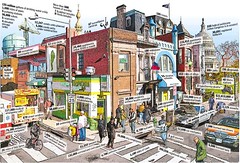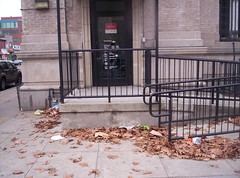Absolute vs. relative

DC by the numbers image by Patterson Clark, Washington Post.
I was lying in bed thinking about the argument for DC statehood, wondering why people don't think the best possible way to make the case for statehood is to have a local government that functions at the best possible level--world class, serving as a best practice example for all other governments nationally (and internationally)?
Why shouldn't the DC Council set its performance standards to act as if it is a State Legislature--and a superlative one, with best practice policy analysis, policy making, and government oversight?
Why shouldn't the Executive Branch of the DC Government function similarly? Shouldn't we have world class schools, world class libraries, a world class public realm, fantastic parks, the best system of locally supported arts, culture, history and heritage, the best possible health and wellness--not just hospital care--system for the citizens, the cleanest streets, the most innovative and efficient system of public transport, an incredible urban environmental policy, and a city that is beautiful overall.

Unkempt branch of Bank of America, 8th and H Streets NE.
And shouldn't every government employee pursue absolute excellence in all that they do, in order to demonstrate the case for statehood?
See:
-- "Red Flags the D.C. Council Ignored" from the Post
-- "Once Again, Gandhi Seeks to Repair an Office's Damaged Reputation" from the Post
-- DC Vote - The Case for Statehood
-- "URBAN STATEHOOD: Why we need more states by Sam Smith" from Progessive Review.
-- "A Norman Mailer Idea Whose Time Hasn’t Come" from the New York Times.
Then I turned on the computer, and one of the articles on the screen is how a 5,000 pound SUV getting 21 mpg in the city and 22 on the highway has been named the "green car of the year."
From the article:
"This is a milestone in many respects,” said Green Car Journal editor and publisher Ron Cogan. “People don’t think ‘green’ when SUVs are concerned, and for generally good reason since SUVs often get poor fuel economy compared to most other vehicles. Chevrolet’s Tahoe Hybrid changes this dynamic with a fuel efficiency improvement of up to 30 percent compared to similar vehicles equipped with a standard V8.”
Now I understand. You don't have to perform in absolute terms. It's merely a matter of performing better than something else, or better than expected.
There are at least three powers of statehood that DC doesn't have:
1. Congress has the ultimate authority to approve or turn down legislation passed by DC City Council;
2. DC doesn't have full taxing authority within its boundaries--by that I don't mean that it can't tax federal land--it can't--but that it can't tax people who work here but don't live here;
3. The citizens don't have full representation in the House of Representatives--a non-voting delegate represents DC, and there are no representatives in the Senate.*
(* In his latest book, A More Perfect Constitution, Larry Sabato suggests that representation in the Senate be changed, that large states be given an additional Senator, and that DC be given one Senator.)
There is plenty to do in the meantime.

Image from DC Vote.
Labels: good government, municipal government, progressive urban political agenda



0 Comments:
Post a Comment
<< Home